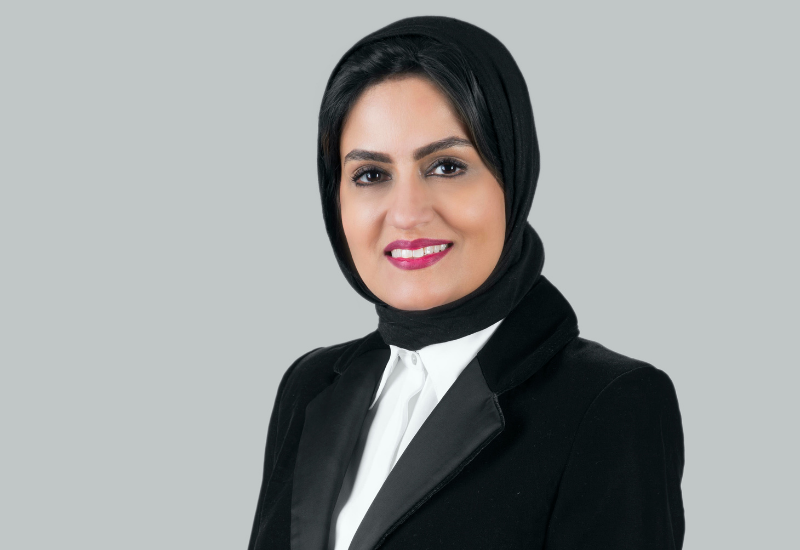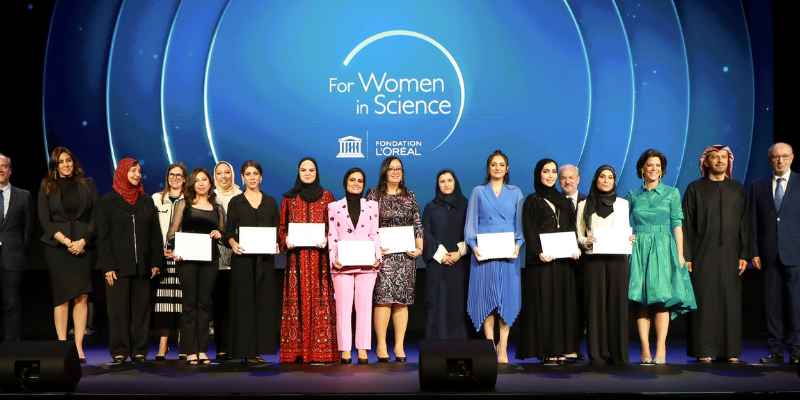Women in science continue to make progress and solve today’s challenges in their respective fields.
To celebrate the International Day of Women and Girls in Science on February 11, 2022, the Foundation L’Oréal and UNESCO took place at the Dubai Exhibition Center at Expo 2020 Dubai to award a total of 14 young talents for their research in Science, Technology, Engineering and Mathematics (STEM).
As science continues to become an important career path for many, this esteemed event awarded women in this field to make them inspiring leaders for future generations.
During the programme Kuwaiti researcher, Dr. Hend Alqaderi was awarded for her research on early diagnosis and disease management of COVID-19 and Emirates Woman exclusively spoke to her to understand more.
Could you elaborate on the research that you’ve conducted?
My research focus has been on understanding the role of oral fluids in diagnosing systemic diseases in a population. I was part of one of the largest longitudinal studies in the Middle East, where we collected data from over 8,000 Kuwaiti children to study risk factors of obesity and diabetes. The oral biomarkers we identified, and lifestyle data allowed us to predict diabetes and obesity outcomes and make recommendations for lifestyle and system changes to health care providers and those involved in public health policy matters to reduce diabetes amongst Kuwaiti children. As an active scholar in the field, I have 13 first-author and co-author publications in peer-reviewed journals. Recently, my colleagues and I set up a large COVID-19 cohort study to assess the changes in oral bacteria and oral immune response to COVID-19 infection in people with mild cases of COVID-19 compared to those who developed severe cases of the disease. Identifying host–viral–microbiome interaction in the oral cavity during the course of a COVID-19 infection may help uncover new strategies for identifying at-risk individuals. This research will further our understanding of the oral bacteria that could potentially explain the immune response and allow us to generate a ‘frontline’ defense against infection and suppress the progression of the clinical symptoms in COVID-19 patients.
What are the challenges you have faced being a woman in a male-dominated field?
Early in my career, I heard about the challenges for women in this male-dominated field but had not noticed any difference between my male colleagues and myself because we were equally represented in the workplace. However, throughout the ten years of my scientific career, I’ve noticed some stereotypes against women. While I acknowledge that most of my male coworkers are supportive and receptive, there are still some outdated attitudes that women belong in the kitchen and taking care of children and shouldn’t deal with challenging work. Therefore, finding the right coworkers and a supportive environment is crucial for any woman to grow and thrive. Yes, there might be some challenges down the road, but I believe that we can overcome these challenges by gaining more experience and skills in our careers and building confidence and emotional intelligence over time. I believe that successful women can change any misconception some people have by building a successful and productive career and working in the right environment. At this stage of my career, I learned that men and women should work together and support each other to achieve success.

Women empowerment is of paramount importance in the UAE. How does it feel to pave the way for so many women in the region?
I am proud to see that the UAE is a leader in the region when it comes to female empowerment. The UAE was the first country in the Arab World and the Middle East to elect a woman as Head of Parliament. There are nine female cabinet ministers in the current government, and women occupy 66% of the government workforce. It feels great to see leadership fully committed to women’s empowerment and their focus on involving women to play a full and equal part in society. Other countries in the region should follow the UAE strategy in empowering women and make it a top priority in their country’s strategic planning. They can do this by focusing on the training and development of female youth and providing opportunities to vulnerable women. As an Arab woman in science, I look forward to participating in women empowerment organizations and groups to help guide and mentor young women researchers in the field. Since the UAE has a well-established platform for women empowerment, I am well positioned to contribute and add value. And since I have relationships with Harvard University and other research institutes in the US, I am eager to facilitate collaboration with researchers in the UAE. Ultimately, these efforts will involve and train more junior women who are passionate about science and research and build more female leaders in the field.
What piece of advice would you give to aspiring researchers in their respective fields?
I believe that the research infrastructure in the Middle East is still emerging, and the field is full of challenges and hurdles that make it unattractive to junior researchers. Funding is the major issue in this field, but the resources are there. To be successful, up-and-coming researchers need to learn how to tap into the resources by working with the right people. There is no straight path to becoming a researcher, but when you make it, the rewards are huge. My message to aspiring researchers is that you can achieve success by finding the right mentors and a prosperous environment to grow and thrive. Work hard, set priorities, and take advantage of opportunities. If you do this, you can build a thriving career and make a real impact in the scientific community.
What are your hopes for the future of women in this country?
I have high hopes for the future of women in this country. Women are no longer resigned to just being ‘involved’ in the future of the UAE, but they can and should lead the way. With more opportunities and support to women, we will see more and more women becoming actively engaged in impactful areas of society such as science and politics. As a result, we will see positive societal changes and scientific advancements for the betterment of all people. I hope that other countries in the region follow suit and establish supportive networks and solid strategies for female engagement in the Middle East.
How does it feel to receive the prestigious L’Oréal UNESCO award and what more do you wish to achieve in the future?
This award will help me acquire the necessary training, practical experience, and knowledge to become a leading independent female researcher in the Middle East. Further, I will share my knowledge and skills with other male and female researchers in the Middle East. Not only will it allow me to conduct my research, but the award also provides a high level of endorsement that will help me highlight my research findings in the media and collaborate with colleagues in the field around the world. I want to show researchers at the global level that women in the Middle East can conduct high-calibre research and achieve great things, and Loreal will deliver this message.
How does it feel to be a woman paving the way in the GCC?
I believe that success comes with responsibility. My goal is to become a successful independent female scientist in my field and a leader. In addition to relentlessly honing my skills and expanding my knowledge, I look forward to engaging and mentoring students and providing opportunities to participate in future research. I am grateful for opportunities like this one to use my voice to warn up-and-coming scientists about the challenges ahead and give them strategies and encouragement to become successful. Further, I feel great satisfaction as I overcome challenges and build relationships in the scientific community, all the while shattering stereotypes and making it a bit easier for other women with big dreams and goals, too.
– For more on luxury lifestyle, news, fashion and beauty follow Emirates Woman on Facebook and Instagram
Images: Supplied











